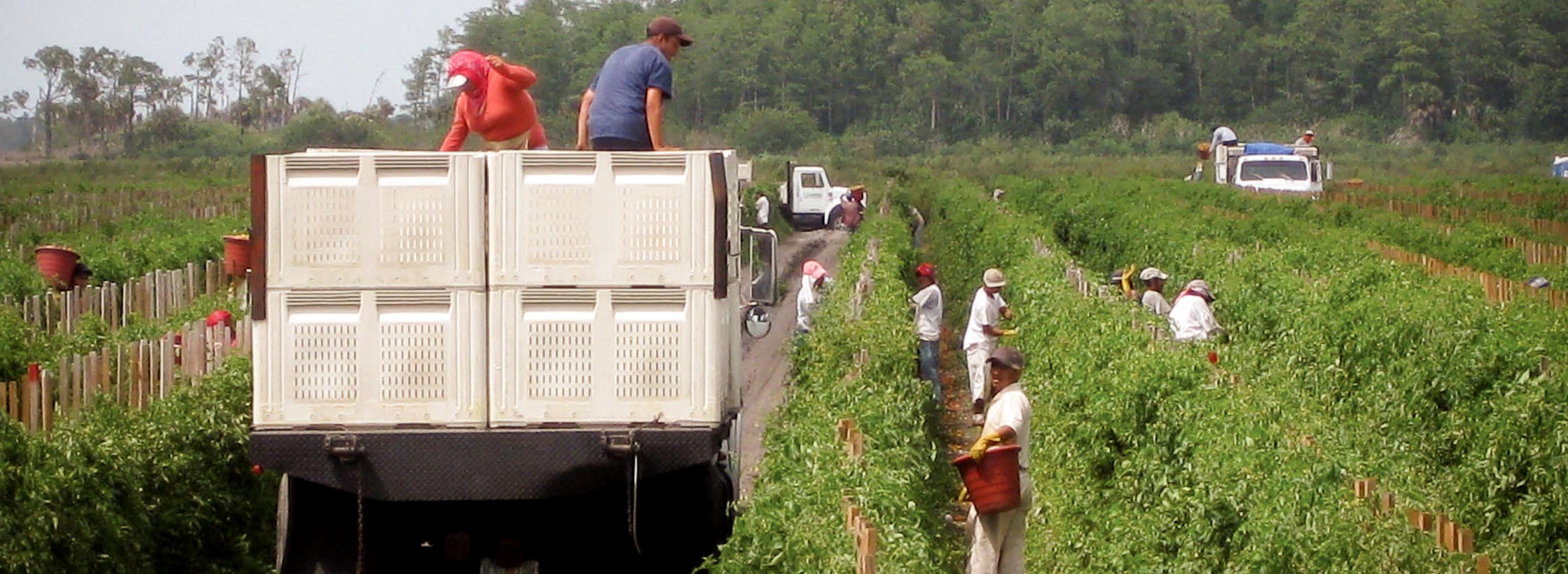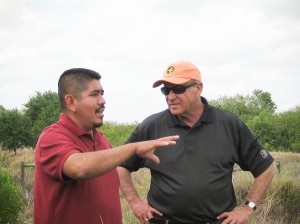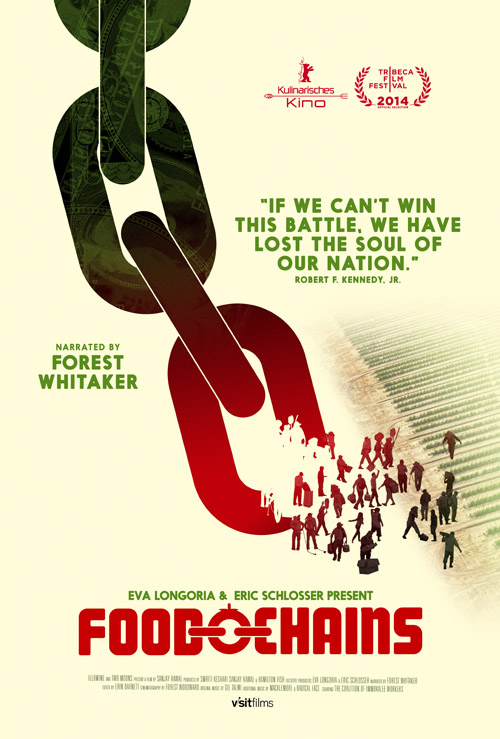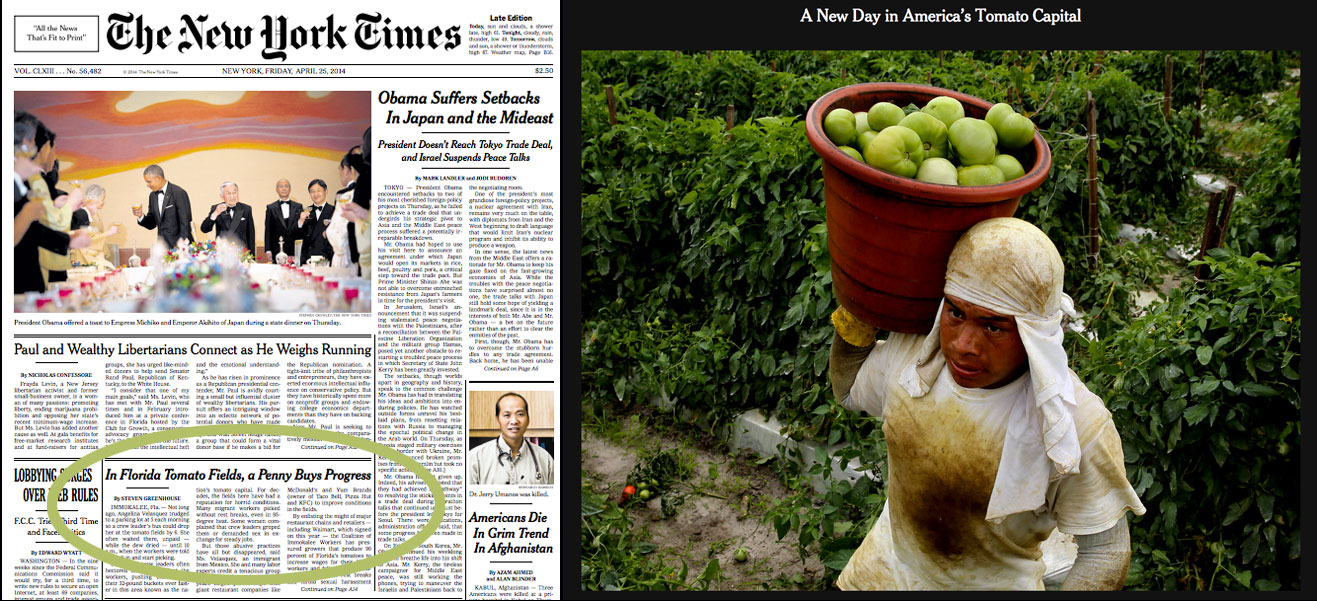
A New Day in the Fields for Farmworkers
On Friday, the New York Times devoted front-page space to the amazing progress that the Coalition of Immokalee Workers has made toward fair treatment of farmworkers.
Labor reporter Steven Greenhouse tells how this “tenacious group of tomato workers” from Immokalee, FL, has successfully “pressured growers that produce 90 percent of Florida’s tomatoes to increase wages for their 30,000 workers and follow strict standards that mandate rest breaks and forbid sexual harassment and verbal abuse.”

CIW leader Lucas Benitez and CEO Fedele Bauccio in 2009
We were proud to be the first food service company to sign on to the CIW’s Fair Food Program, in 2009. We did so voluntarily, after reading about the horrible working conditions in the fields, which include documented cases of actual enslavement. CEO Fedele Bauccio and I traveled to Immokalee, met with CIW leaders — including Lucas Benitez, Gerardo Reyes Chávez, and Greg Asbed — and together we hashed out a Code of Conduct that we have required our Florida tomato suppliers to follow ever since.
CIW has gone on to persuade numerous other restaurant companies and retailers to increase wages for tomato pickers by a penny per pound. I returned in 2012 and was happy to see much had already changed as a result. But the CIW’s biggest victory, as Greenhouse reports, may be its recent partnership with Walmart. The world’s biggest retailer has agreed to extend the Fair Food Program’s standards and monitoring beyond Florida, to its tomato suppliers in Georgia, South Carolina, Virginia, and other Eastern Seaboard states as well as possibly to apple orchards and strawberry fields around America.

Cheryl Queen, Compass VP of Communications, and I marched with the CIW last year
This indeed marks a new day for farmworkers, as one of the CIW’s protest signs proclaims. (I joined the CIW on a march last year.) I am amazed to see so much progress in such short time.
I believe more is coming. A few days ago, I attended the U.S. premiere of Food Chains, a documentary about the CIW by Sanjay Rawal and executive produced by Fast Food Nation author Eric Schlosser and actress Eva Longoria (who is also featured in the film). Bon Appétit assisted in the early stages of getting Food Chains off the ground, including inviting Sanjay to present the first trailer at our 2011 farm-labor conference TEDxFruitvale.
 Food Chains is a powerfully moving film, focusing on the CIW’s efforts to show the challenges all farmworkers face, from wage theft to sexual harassment to a lack of affordable housing. It was wonderful to see Lucas, Gerardo, Greg, and other key players applauded in person by the packed house at the TriBeCa Film Festival. When the film is released this fall, I believe that the few companies that still refuse to sign on to the Fair Food Program may finally see the light.
Food Chains is a powerfully moving film, focusing on the CIW’s efforts to show the challenges all farmworkers face, from wage theft to sexual harassment to a lack of affordable housing. It was wonderful to see Lucas, Gerardo, Greg, and other key players applauded in person by the packed house at the TriBeCa Film Festival. When the film is released this fall, I believe that the few companies that still refuse to sign on to the Fair Food Program may finally see the light.
In the panel discussion that followed the film, the last audience member to be called on stood up and pointed to Gerardo. He said, “You’re making this country better for everyone — not just for farmworkers.”
We couldn’t agree more.
Learn more:
- In Florida Tomato Fields, a Penny Buys Progress, Steven Greenhouse, New York Times, April 2014
- Putting the Squeeze on Tomato Growers to Improve Conditions for Farm Workers, Jane Black, Washington Post, April 2009
- Video highlights from the Bon Appétit Management Company Foundation’s 2011 TEDxFruitvale: Harvesting Change farm labor conference:
- Making Corporations Pay, Gerardo Reyes Chávez
- Why We Care About Farmworkers, Maisie Greenawalt
- Following the Money in Lake Apopka, FL, Barry Estabrook, author of Tomatoland (about the CIW)
